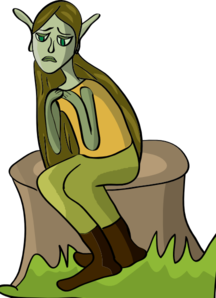Creating Characters in Fantasy
Once the "suspended belief" world is defined, it must be filled with characters.
One of the obvious choices is to "people" the world with fantastical beings such as elves, fairies, ogres, dwarves, or other imaginary creations. All well and good, as long as they suit the tale.
But, how do you make those creations "real" for the reader?
 I like to describe the way to do this as establishing "touchstones," in each character. The word suggests, to me, that there is some quality developed in each character that readers and latch on to, or relate to that makes the character become real to them. It's a quality, behavior, emotion, or attitude making the character "human" enough that he/she can be understood.
I like to describe the way to do this as establishing "touchstones," in each character. The word suggests, to me, that there is some quality developed in each character that readers and latch on to, or relate to that makes the character become real to them. It's a quality, behavior, emotion, or attitude making the character "human" enough that he/she can be understood.It's hard to relate to a totally alien creature. I often think of characters from successful science fiction as an example of this. For instance, Mr. Spock, of Star Trek fame, is a Vulcan, an alien being whose life is supposed to be devoid of emotion. His "rule of life" is to be totally logical about everything. If he were that cold and calculating about everything, it would be hard to really sympathize with him. If he felt nothing at all when confronted with conflict, acting only with precise, logical responses, the audience would soon lose interest in actually caring about him.
But Spock is, himself, in conflict. Born half-human, he is often overwhelmed with human emotions preying on his Vulcan indifference, challenging him to feel and respond. This internal conflict actually makes him more sympathetic as the audience, themselves often fighting to control their own emotions, powerfully relates to his struggle. In this way, an alien being is connected to their own lives and becomes a beloved hero.
A successful fantasy character needs to connect to the reader in the same way. He/she must have some traits, feelings, reactions, or behaviors the reader can recognize and relate to. Does he love, hate, dream, feel pain, suffer, laugh, or struggle in some way a human reader can actually understand, not only in mind, but also in heart?
Even monsters tend to have at least some "touchstone" connection. Do they kill to survive, to protect, or even out of hunger? Most monsters do.
But there are exceptions, and to me, they become the most frightening ones of all. The unrelenting killing machine with no rhyme or reason is a terrifying foe.
More about that later.
Saga of Magiskeep for Kindle